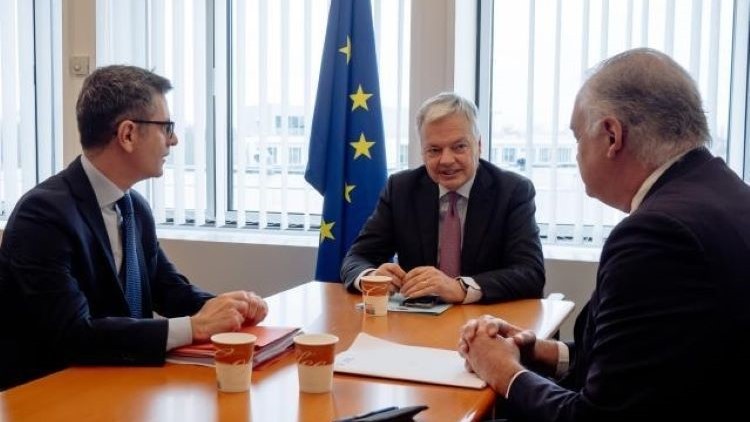The Diplomat
The meeting that the Justice Commissioner, Didier Reynders, proposed to hold this Wednesday in Madrid with the PSOE and PP negotiators to seek an agreement to unblock the renewal of the General Council of the Judiciary (CGPJ) was finally postponed at the request of the ‘popular’ and after Brussels found that the parties needed “more time”.
EU sources told Europa Press that the reason for the postponement “in no way” has to do with the agenda of the Commissioner, who “is available” to travel to Madrid “as soon as the parties are ready to meet”.
After the last mediation meeting held in Strasbourg (France) on 13 March, Reynders proposed to the negotiators, the Minister for the Presidency, Justice and Relations with the Courts, Félix Bolaños, and the PP’s Deputy Secretary for Institutional Action, Esteban González Pons, to meet again in Madrid on Wednesday 27 March.
The plane tickets for Reynders and his team had already been bought at the end of last week, according to the sources consulted, but were finally cancelled after it was realised that Bolaños and Pons “needed more time” before a new meeting could be held. It was the Popular Party, according to Brussels, who asked for the meeting to be “delayed”.
The announcement of the postponement coincides with the official announcement of Reynders’ candidacy to become Secretary General of the Council of Europe – a body outside the EU but which the institutions listen to in order to set their standards on the rule of law.
The confirmation that Reynders has been selected as one of the finalists will force him to take unpaid leave to focus on the Council of Europe campaign, although it will be up to the President of the Council of Europe, Ursula von der Leyen, to decide in the coming hours which other member of the College of Commissioners will take over his portfolio.
Yesterday, the spokesman for the Partido Popular, Borja Sémper, warned at a press conference that “that meeting is not going to take place, it is not confirmed that it will be on Wednesday”, without clarifying the reasons for the postponement, while adding that “whenever” the meeting takes place, the PP is going to “insist until the end” on the objective of reaching an agreement.
Both the PSOE and the PP have declared their willingness to seek a solution and turned to the EU executive as a facilitator, for which Reynders established a “structured dialogue” based on the annual recommendations on the rule of law.
In these recommendations, the Commission urges Spain to renew the judges’ governing body as a matter of priority and to initiate “immediately afterwards” the process of reforming the system for electing members of the judiciary.
Despite the talks that began in Brussels on 31 January, the PSOE and PP have still not resolved their differences over the timing of the reform of the model for electing judges, which the government wants to leave until after the urgent renewal, but which the PP wants to complete in a parallel process. Even so, Reynders was optimistic after the third meeting in mid-March and said he still saw a “possibility” of agreement and pledged to “continue working” to contribute to “stabilising” the situation.







